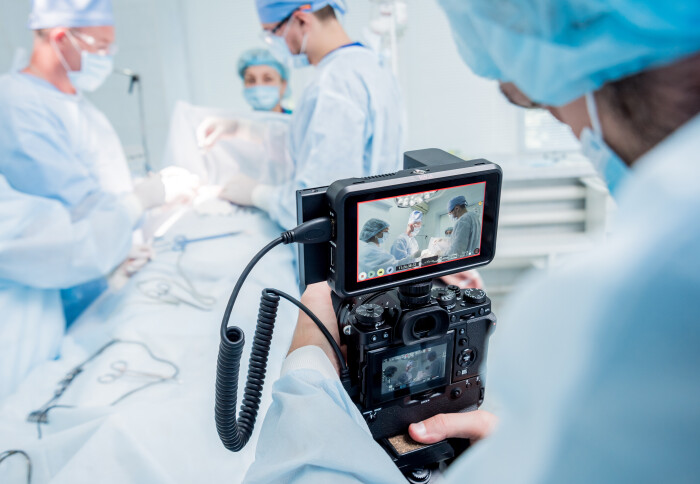Surgery video recording practices vary widely across the NHS
by Samantha Rey

The first national study of surgical video across the NHS has revealed that policies and procedures vary significantly.
Recording surgical procedures can provide an invaluable tool to train clinical staff, but the policies in place around video recording for training vary hugely from one hospital to the next, a study has found.
In a review of current practices across in England and Wales, only a minority (16%) of NHS Trusts said they routinely record their surgeries, and the decision to video operations was often left to the consultant surgeon. Yet almost half of Trusts surveyed (46%) said they did have the necessary recording technology in place.
Researchers at Imperial College London sent Freedom of Information requests to all acute NHS Trusts and Boards in England and Wales asking for details of their procedures, policies and governance around surgical video.
Recorded operations are objective and can capture far more information than a surgeon’s written notes Dr James Kinross Department of Surgery & Cancer
Less than half of Trusts who responded (42%) had governance policies covering surgical video recording, as well as the storage and use of recordings. Platforms used to store videos also varied widely; some Trusts used internal systems to store recordings, others used third party software platforms. Consent and access policies and procedures also varied.
Currently, NHS hospitals are legally permitted to video record surgical procedures for education and training purposes. The General Medical Council (GMC) guidance does not require separate consent from patients for images and recordings taken in body cavities, as long as the patient cannot be identified.
Missed opportunity
At present, the clinical standard for most hospitals is for the surgeon to write notes after an operation, but the researchers say this represents a missed opportunity for the NHS for learning and improvement.
Dr James Kinross, from Imperial’s Department of Surgery & Cancer, who led the study, said: “Recorded operations are objective and can capture far more information than a surgeon’s written notes. Recordings can be used to assess surgical skill, link to how well a patient does after surgery, and can provide training and research opportunities for clinicians. All of this will ultimately benefit surgeons, healthcare providers, and most importantly, the patient.”

Credit: Shutterstock
According to the researchers, the findings are also important to the emerging field of surgical data science – which aims to improve the quality of all interventional healthcare using data analysis and modelling – since this relies on surgical video as an input for modelling and analysis. The researchers are calling for NHS Trusts and Boards to prioritise and coordinate their policies on surgical video, which they hope will lead to more regular recording practices.
Researcher Dr Andrew Yiu explained: “Thousands of surgical procedures are carried out on the NHS every day. This study is the first proper snapshot of what’s happening across the Health Service. We hope it will provide an opportunity to improve how we learn from, and improve upon, surgical procedures.”
“There is a clear need for a more coordinated approach. Increased availability of surgical video is absolutely essential if patients and surgeons are going to benefit from the ongoing digital transformation of surgery and healthcare.”
The study was supported by the National Institute for Health Research (NIHR) Imperial Biomedical Research Centre (BRC).
‘Adoption of routine surgical video recording: a nationwide Freedom of Information Act request across England and Wales’ by Andrew Yiu, Kyle Lam, James Kinross et al is published in EClinical Medicine.
Article supporters
Article text (excluding photos or graphics) © Imperial College London.
Photos and graphics subject to third party copyright used with permission or © Imperial College London.
Reporter
Samantha Rey
Communications Division